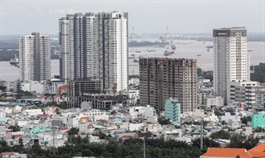Real Estate eye digital technology to raise capital
Real Estate eye digital technology to raise capital
Digital technology for raising capital for real estate projects is quite new but will provide many opportunities for investors. However, an appropriate legal framework is required for this purpose to cover the interests of concerned parties.
Ilustrative photo. |
Some experts shared different ideas and opinions on this issue at a conference in Ho Chi Minh City held last week, which was co-organized by the Faculty of Finance at the University of Economics in Ho Chi Minh City and Saigon Investment.
New approach
It is estimated that the total value of real estate in the world is greater than the total value of all the bonds and stocks together, and four times the global GDP. Since Real Estate Property (REP) is of high value, it generally draws the attention of a large number of people, but only financially strong people are able to make investments in it.
Therefore, splitting the value of real estate properties into smaller pieces with the aid of digital technology, to give smaller investors a chance, has recently caught the interest of a large number of people. The involvement of a bigger number of people in a market can help increase transparency, with more people monitoring the investment process. By also working from home remotely, they contribute to containing the pandemic and stopping it from spreading.
Experts have analyzed that this is a way to make capital contribution by using digital technology as a medium. After that, the investors are given the profits. They do not own a square meter or half a square meter of a REP, nor do they have their names listed in a REP ownership book, but they are entitled to supervise the process of investment or transfer of such a REP.
Nevertheless, this approach may be troublesome in some ways. For instance, it is easy for young people who are adept at using the required technologies, as the knowledge about the platforms for the activities is not commonly known to the public.
Dr. Dinh Thi Thu Hong, Dean of Faculty of Finance of UEH, stressed that the approach to raise money for real estate projects by using digital technology is a new innovation. At present, Vietnam does not have any legal regulation on activities for raising funds for real estate properties by using technology like blockchain or crowdfunding. However, there has been a growing need for investment in fintech, and especially proptech, by using the blockchain technology.
Having monitored this activity for quite a while, Dr. Phan Phuong Nam, Deputy Dean of the Trade Law Faculty of UEH, said that some institutions have begun raising funds by using the token platform, with three main activities, namely, business cooperation contracts, joint ownership and real estate investment trusts.
Mr. Nguyen Trieu Dong, MA, lecturer at UEH, said that tokenization is the natural evolution of securitization, creating an opportunity for transparency of information and transactions based on the blockchain technology. Investors just need a small capital for their investment in REP. This smart-contract-based investment approach is very flexible, quick and does not require intermediaries, which minimizes the costs and administrative formalities necessary in order to get REP ownership transferred.
No legal path
Mr. Nguyen Trieu Dong, MA, believes the real challenge to this business activity includes a legal framework and a technical platform for using the technology, coping with disputes between token holders and possible conflicts, plus tax on transactions. Therefore, in order to promote this business activity in Vietnam, the State needs to provide necessary tryout rules, incentives, procedures and a tax policy as a drive for its development in the market and complete a revised legal framework for digital property so that people can feel secure about their business activities.
According to Mr. Nguyen Trieu Dong, MA, for development of this business activity in the future, it will be essential to have a digital currency system that can grow and harmonize with this area of digital property.
Additionally, it will facilitate links and connection with the global markets and increase liquidity of investment products as well as the effectiveness of product competence exploitation, contributing to the significant growth of the entire economy. He also believes that what is important is ensuring transparency of the information about REP planning and information about disputes or limited transactions.
From a macroeconomic perspective, Prof. Tran Ngoc Tho, a member of the National Financial and Monetary Policy Advisory Council, said that it is very important to manage risks of international payment activities at banks to ensure safety of proptech activities. How to control such activities satisfactorily is based on how business activities are conducted and how this kind of investment can be beneficial for the whole society and the entire economy, rather than for investors only. When it finally comes into existence, it will be absolutely imperative that we have regulations on how to manage risks and cope with problems, especially tax evasion and money laundering.
Prof. Tho believes that when a new form of investment or technology product comes into existence, competent agencies are required to take it into consideration so as to optimize the technology advantages while striving to minimize risks. As far as international payments are concerned, the authorized agencies will also need to take into account the criteria for financial leverage, anti-money laundering, counter-terrorism, internet safety and other concerns in an effort to successfully protect the interests of the concerned parties. It is vital to ensure that activities with extraordinary values will not be irrationally blocked.
Several participants at the conference questioned the legal aspects of this technology concerning business activity, as this type of business is new in Vietnam. As a result, there is no specific legal corridor, nor a legal framework for digital REP business activities. Therefore, it is not clear how risks can be managed or how disputes will be tackled either, and what can be settled in accordance with legal regulations.
A legal framework for using digital technology to raise finance for real estate projects needs to be introduced soon in order to manage risks in REP business activities and optimize its benefits.




























